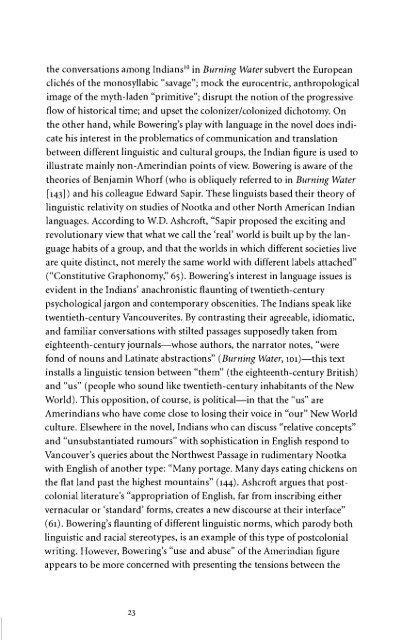The Carpathians - University of British Columbia
The Carpathians - University of British Columbia
The Carpathians - University of British Columbia
You also want an ePaper? Increase the reach of your titles
YUMPU automatically turns print PDFs into web optimized ePapers that Google loves.
the conversations among Indians 10 in Burning Water subvert the European<br />
clichés <strong>of</strong> the monosyllabic "savage"; mock the eurocentric, anthropological<br />
image <strong>of</strong> the myth-laden "primitive"; disrupt the notion <strong>of</strong> the progressive<br />
flow <strong>of</strong> historical time; and upset the colonizer/colonized dichotomy. On<br />
the other hand, while Bowering's play with language in the novel does indicate<br />
his interest in the problematics <strong>of</strong> communication and translation<br />
between different linguistic and cultural groups, the Indian figure is used to<br />
illustrate mainly non-Amerindian points <strong>of</strong> view. Bowering is aware <strong>of</strong> the<br />
theories <strong>of</strong> Benjamin Whorf (who is obliquely referred to in Burning Water<br />
[143]) and his colleague Edward Sapir. <strong>The</strong>se linguists based their theory <strong>of</strong><br />
linguistic relativity on studies <strong>of</strong> Nootka and other North American Indian<br />
languages. According to W.D. Ashcr<strong>of</strong>t, "Sapir proposed the exciting and<br />
revolutionary view that what we call the 'real' world is built up by the language<br />
habits <strong>of</strong> a group, and that the worlds in which different societies live<br />
are quite distinct, not merely the same world with different labels attached"<br />
("Constitutive Graphonomy," 65). Bowering's interest in language issues is<br />
evident in the Indians' anachronistic flaunting <strong>of</strong> twentieth-century<br />
psychological jargon and contemporary obscenities. <strong>The</strong> Indians speak like<br />
twentieth-century Vancouverites. By contrasting their agreeable, idiomatic,<br />
and familiar conversations with stilted passages supposedly taken from<br />
eighteenth-century journals—whose authors, the narrator notes, "were<br />
fond <strong>of</strong> nouns and Latinate abstractions" {Burning Water, 101)—this text<br />
installs a linguistic tension between "them" (the eighteenth-century <strong>British</strong>)<br />
and "us" (people who sound like twentieth-century inhabitants <strong>of</strong> the New<br />
World). This opposition, <strong>of</strong> course, is political—in that the "us" are<br />
Amerindians who have come close to losing their voice in "our" New World<br />
culture. Elsewhere in the novel, Indians who can discuss "relative concepts"<br />
and "unsubstantiated rumours" with sophistication in English respond to<br />
Vancouver's queries about the Northwest Passage in rudimentary Nootka<br />
with English <strong>of</strong> another type: "Many portage. Many days eating chickens on<br />
the flat land past the highest mountains" (144). Ashcr<strong>of</strong>t argues that postcolonial<br />
literature's "appropriation <strong>of</strong> English, far from inscribing either<br />
vernacular or 'standard' forms, creates a new discourse at their interface"<br />
(61). Bowering's flaunting <strong>of</strong> different linguistic norms, which parody both<br />
linguistic and racial stereotypes, is an example <strong>of</strong> this type <strong>of</strong> postcolonial<br />
writing. However, Bowering's "use and abuse" <strong>of</strong> the Amerindian figure<br />
appears to be more concerned with presenting the tensions between the

















